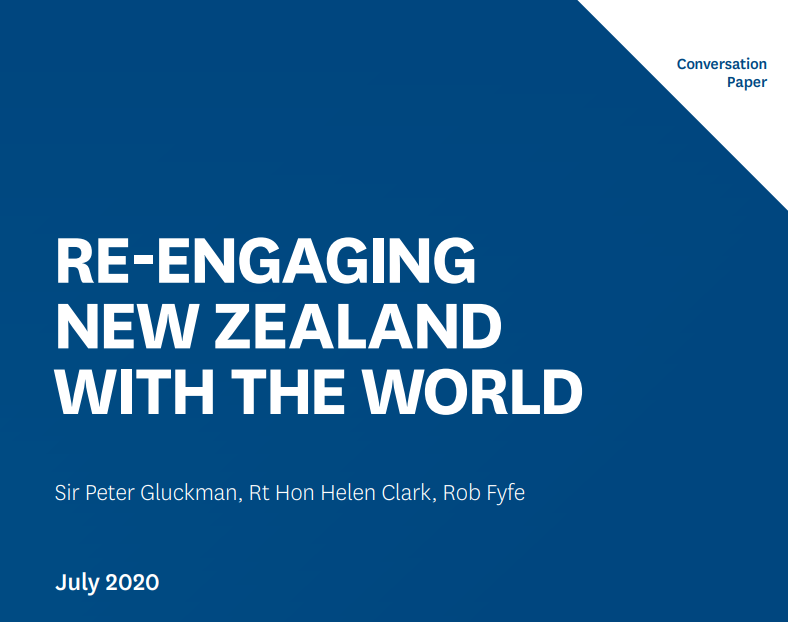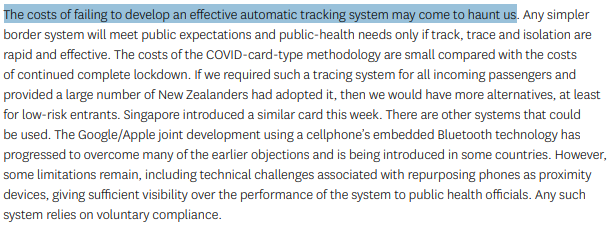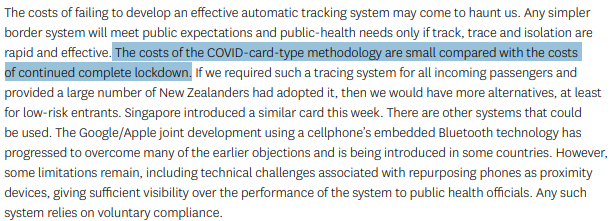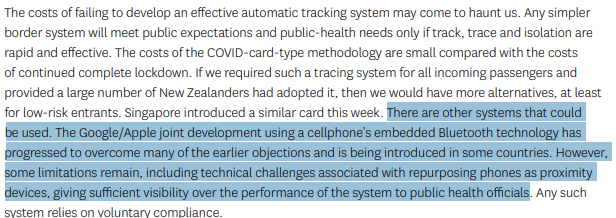How the hell does Rob Fyfe keep finding new people to co-front his shit takes?
I think its pretty clear to everyone that this is just a continued, blatant, push to sell his "bluetooth contact card".
Incredibly disappointed in @HelenClarkNZ. https://www.rnz.co.nz/news/national/420412/nz-must-consider-opening-borders-gluckman-clark-fyfe">https://www.rnz.co.nz/news/nati...
I think its pretty clear to everyone that this is just a continued, blatant, push to sell his "bluetooth contact card".
Incredibly disappointed in @HelenClarkNZ. https://www.rnz.co.nz/news/national/420412/nz-must-consider-opening-borders-gluckman-clark-fyfe">https://www.rnz.co.nz/news/nati...
Apparently a "Conversation Paper" is what you self publish when you can& #39;t find a news outlet to release it as an opinion column.  https://abs.twimg.com/emoji/v2/... draggable="false" alt="🙄" title="Gesicht mit rollenden Augen" aria-label="Emoji: Gesicht mit rollenden Augen">
https://abs.twimg.com/emoji/v2/... draggable="false" alt="🙄" title="Gesicht mit rollenden Augen" aria-label="Emoji: Gesicht mit rollenden Augen">
The paper itself is... a mess. So let& #39;s break it down a bit, shall we?
So we& #39;re starting off with setting the premise that we need to be transparent and adaptive in our strategy.
Cool. So I assume this paper will discuss a range of options that we can use to better protect New Zealand.
Cool. So I assume this paper will discuss a range of options that we can use to better protect New Zealand.
Early in the crisis we shifted strategy (as one might expect from an adaptive strategy), but this required huge sacrifice from Kiwis (yep), which is a burden that will continue to echo for many years (current economic models show NZ faring better than most other OECD countries).
This is a false dichotomy - an attempt to imply that the "former" definition (elimination=0 cases) is "impossible" unless we continue with an "aggressive and foolproof" border procedure for a "long time".
But even with the "latter" definition of elimination, we still need this!
But even with the "latter" definition of elimination, we still need this!
Hard eyeroll here.
Because smugglers (who are knowingly trying to bypass border controls) and people who are legally entering the borders and may unknowingly be carrying the virus are not materially different in any way.
Because smugglers (who are knowingly trying to bypass border controls) and people who are legally entering the borders and may unknowingly be carrying the virus are not materially different in any way.
This is a good example for the infosec community to dissect actually.
Is your threat modeling/security strategy different for active bad actors vs well-meaning "fools"? One would assume that they& #39;re fools if your controls need be "foolproof".
Is your threat modeling/security strategy different for active bad actors vs well-meaning "fools"? One would assume that they& #39;re fools if your controls need be "foolproof".
This appears to be some blatant complaining that the government isn& #39;t developing their strategy "though a collaborative process" (assumably with Fyfe).
"Many stakeholders continue to be at the mercy of such decisions" (uh, yeah. Its a worldwide crisis) and "those stakeholders are not just businesses" (well we didn& #39;t think they were, but now you& #39;ve implied that they are), "they are indirectly every New Zealander".
So now they& #39;ve asserted that the main stakeholders in developing a process to move past quarantine aren& #39;t, directly, New Zealanders.
They are, in fact, businesses.
My response? Fuck off. The stakeholders are Kiwis. This isn& #39;t about businesses and revenue. This is about lives.
They are, in fact, businesses.
My response? Fuck off. The stakeholders are Kiwis. This isn& #39;t about businesses and revenue. This is about lives.
So lets reframe the rest of this "conversation" as though they were talking about Kiwis. Instead of businesses as they& #39;ve clearly asserted.
A vaccine could be "years" away! How could we (Kiwis) *possibly* survive in "almost total physical isolation? And at WHAT COST?" (I imagine a fair bit of hand wringing here).
This seems like an intentional reframing of the issue to evok the hardship Kiwis are already suffered via lockdown and equate that to Kiwi& #39;s being isolated *to New Zealand*.
Keep in mind that goods are still moving in and out.
So what we& #39;re giving up is the movement of people. Do Kiwis want to travel overseas while the world is being ravaged by a pandemic? How much hardship is it to simply stay in New Zealand for a couple years?
So what we& #39;re giving up is the movement of people. Do Kiwis want to travel overseas while the world is being ravaged by a pandemic? How much hardship is it to simply stay in New Zealand for a couple years?
I find this particularly funny. The implication that keeping our borders closed negatively impacts the way "New Zealand projects and leverages its place in the world".
Because if anything it& #39;s clearly the opposite.
Because if anything it& #39;s clearly the opposite.
Ardern had already raised New Zealand& #39;s international profile in her first couple years.
SINCE the pandemic she and New Zealand& #39;s popularity and standing overseas has gone stratospheric.
SINCE the pandemic she and New Zealand& #39;s popularity and standing overseas has gone stratospheric.
Previously friend and family overseas had very little idea of the news or goings on in New Zealand.
Now, every call involves them waxing poetic about how well New Zealand has done and how jealous they are of us living here.
A pretty good image to be projecting to the world.
Now, every call involves them waxing poetic about how well New Zealand has done and how jealous they are of us living here.
A pretty good image to be projecting to the world.
I& #39;m a bit confused here. There is an implication that the current policies they reference "have not been foolproof", by which I assume they mean lead to breaches?
But the only breach was before these policies were implemented - all other cases have been successfully quarantined.
But the only breach was before these policies were implemented - all other cases have been successfully quarantined.
They also pose a lot of questions that... the government is already discussing?
"More people are coming home, how do we handle the volume?"
"Who pays for quarantine?"
We know these issues are being considered. Because they& #39;re talked about in briefings CONSTANTLY.
"More people are coming home, how do we handle the volume?"
"Who pays for quarantine?"
We know these issues are being considered. Because they& #39;re talked about in briefings CONSTANTLY.
And now we& #39;re do the "let& #39;s propose solutions" phase of the "conversation".
The great @SiouxsieW has done a great job talking through many of these in @TheSpinoffTV articles.
Needless to say "volume & cost" aren& #39;t the main reason these are not in use - its that they& #39;re risky.
The great @SiouxsieW has done a great job talking through many of these in @TheSpinoffTV articles.
Needless to say "volume & cost" aren& #39;t the main reason these are not in use - its that they& #39;re risky.
Now we& #39;re getting into the meat of it.
"At what point will New Zealand accept less than absolute elimination?" A bit confusing given that they previously provided two definitions of elimination. So lets assume they& #39;re referring to Dr Skegg& #39;s version.
"At what point will New Zealand accept less than absolute elimination?" A bit confusing given that they previously provided two definitions of elimination. So lets assume they& #39;re referring to Dr Skegg& #39;s version.
Under Dr Skegg& #39;s definition of elimination (reduction of case-transmission to a predetermined very low level), that is exactly what we& #39;ve been doing already.
An extremely low level of cases in New Zealand, already isolated and traceable, with no community transmission.
An extremely low level of cases in New Zealand, already isolated and traceable, with no community transmission.
WHAT?! The whole point of a "goal" is something to aim for.
The fact we& #39;re already achieving it is incredible. And, having already achieved it, makes it much much easier to maintain.
The fact we& #39;re already achieving it is incredible. And, having already achieved it, makes it much much easier to maintain.
Labeling the goal "unrealistic" means ceeding to the inevitability of NZ sliding into the same COVID chaos engulfing the rest of the world.
But its our pursuit and achievement of that "unrealistic" goal that has led us to our current incredibly enviable position.
Maintain that.
But its our pursuit and achievement of that "unrealistic" goal that has led us to our current incredibly enviable position.
Maintain that.
You know how you get them to not occur? By maintaining tight border controls so that the virus can& #39;t come in from overseas.
If a highly protective vaccine is unlikely and coverage will no be absolute (both true), perhaps we maintain the situation where we have it eliminated?
If a highly protective vaccine is unlikely and coverage will no be absolute (both true), perhaps we maintain the situation where we have it eliminated?
So lets just forget about elimination (because yolo!), vaccines aren& #39;t 100% effective and may not even exist, so lets do the sensible thing of reducing quarantine and INCREASING THE RISK OF THE VIRUS APPEARING IN THE COMMUNITY.
Honestly, this paragraph is such a clusterfuck I could go on about it for hours.
But lets move on.
And here it gets even better again. So basically if we gut the current quarantine system (because yolo! COVID is going to appear anyway), because of the vastly increased risk we& #39;d have to implement a "highly effective, high-speed contact tracing system"
And here it gets even better again. So basically if we gut the current quarantine system (because yolo! COVID is going to appear anyway), because of the vastly increased risk we& #39;d have to implement a "highly effective, high-speed contact tracing system"
That seems pretty specific. It& #39;s almost like an author of this paper has a vested interest in something that could solve this problem that they& #39;ve spend two single spaced pages of ethical contortions to pose...
Ah, we& #39;re getting into the real sales pitch now. Here& #39;s the FUD (fear, uncertainty, and doubt) that is the hallmark of manipulative sales pitches everywhere.
Another hallmark of manipulative sales pitches:
"The costs... are small compared with the costs of continued complete lockdown."
A misleading comparison of the costs. We spend the paper talking about the cost of quarantine, but now we compare the cost against lockdown?
"The costs... are small compared with the costs of continued complete lockdown."
A misleading comparison of the costs. We spend the paper talking about the cost of quarantine, but now we compare the cost against lockdown?
I think I might know a cheaper way: continue to ensure our border protections are robust enough that we don& #39;t need another lockdown to begin with!
With the, small, added benefits of saving for our healthcare system and the preservation of literally thousands of lives.
With the, small, added benefits of saving for our healthcare system and the preservation of literally thousands of lives.
I think you& #39;ll find that privacy experts have been warning about the amount of information corporations quietly collect on users.
"The ethical arguments against such technologies have perhaps been overstated" seems an odd hill to die on when you go on to compare government collection of personal data via these technologies to Uber, a company renowned for privacy & ethics breaches.
Honestly, I& #39;m very surprised @andrewtychen let his name be put to this.
And yes, I realise the whole "ethics" argument was really setup as simply another neg on the competition.
Yes. The quarantine/moat tactic is working wonders while the rest of the world is on fire.
Why on earth would we change tactics now?!
Why on earth would we change tactics now?!
Yes, yes. I understand that we& #39;ll have to change strategy at some point. But this is an unprecedented and fast moving crisis. Nobody knows what is going to happen.
Any anyone who says they do, probably has a bluetooth contact tracing card to sell you.  https://abs.twimg.com/emoji/v2/... draggable="false" alt="😉" title="Zwinkerndes Gesicht" aria-label="Emoji: Zwinkerndes Gesicht">
https://abs.twimg.com/emoji/v2/... draggable="false" alt="😉" title="Zwinkerndes Gesicht" aria-label="Emoji: Zwinkerndes Gesicht">
But seriously, lets start considering options to ease travel restrictions once the world starts getting COVID-19 under control instead of when the spread is just continuing to accelerate.
"We need face-to-face contact if we are to maintain and grow the flow of goods and services into New Zealand"
Why?
Why?
Also, this again shows that this "conversation" really considers the stakeholders to just be businesses.
And that this entire argument is framed by a man who previously ran a business focused entirely on enabling Kiwis to obtain "face-to-face contact" with those overseas.
And that this entire argument is framed by a man who previously ran a business focused entirely on enabling Kiwis to obtain "face-to-face contact" with those overseas.
New Zealand has some of the best global connectivity (for a country with its population density) in the world.
We should be investing in businesses that can operate and grow in this new reality rather than those that require face-to-face contact in a world ravaged by pandemic.
We should be investing in businesses that can operate and grow in this new reality rather than those that require face-to-face contact in a world ravaged by pandemic.
They keep saying things like "effective national isolation" which sounds much more dramatic than "travel restrictions" or "quarantine for arrivals".
You& #39;re not featuring on Lost, mate. Nobody has locked you in your house and cut the phone lines.
You& #39;re not featuring on Lost, mate. Nobody has locked you in your house and cut the phone lines.
Nice of them to recognise that "!national isolation!" may be our best option... three and a half single spaced pages into the conversation.
I hope we can consider their alternative now fully explored.
I hope we can consider their alternative now fully explored.
One one side of the balance is keeping COVID-19 eliminated. Whats on the other?
Could it be that Fyfe is arguing that "business stakeholder" economic incentives should outweigh Kiwi stakeholder literal lives? https://abs.twimg.com/emoji/v2/... draggable="false" alt="🤔" title="Denkendes Gesicht" aria-label="Emoji: Denkendes Gesicht">
https://abs.twimg.com/emoji/v2/... draggable="false" alt="🤔" title="Denkendes Gesicht" aria-label="Emoji: Denkendes Gesicht">
Could it be that Fyfe is arguing that "business stakeholder" economic incentives should outweigh Kiwi stakeholder literal lives?

 Read on Twitter
Read on Twitter " title="Apparently a "Conversation Paper" is what you self publish when you can& #39;t find a news outlet to release it as an opinion column. https://abs.twimg.com/emoji/v2/... draggable="false" alt="🙄" title="Gesicht mit rollenden Augen" aria-label="Emoji: Gesicht mit rollenden Augen">" class="img-responsive" style="max-width:100%;"/>
" title="Apparently a "Conversation Paper" is what you self publish when you can& #39;t find a news outlet to release it as an opinion column. https://abs.twimg.com/emoji/v2/... draggable="false" alt="🙄" title="Gesicht mit rollenden Augen" aria-label="Emoji: Gesicht mit rollenden Augen">" class="img-responsive" style="max-width:100%;"/>

























 " title="One one side of the balance is keeping COVID-19 eliminated. Whats on the other?Could it be that Fyfe is arguing that "business stakeholder" economic incentives should outweigh Kiwi stakeholder literal lives? https://abs.twimg.com/emoji/v2/... draggable="false" alt="🤔" title="Denkendes Gesicht" aria-label="Emoji: Denkendes Gesicht">" class="img-responsive" style="max-width:100%;"/>
" title="One one side of the balance is keeping COVID-19 eliminated. Whats on the other?Could it be that Fyfe is arguing that "business stakeholder" economic incentives should outweigh Kiwi stakeholder literal lives? https://abs.twimg.com/emoji/v2/... draggable="false" alt="🤔" title="Denkendes Gesicht" aria-label="Emoji: Denkendes Gesicht">" class="img-responsive" style="max-width:100%;"/>


